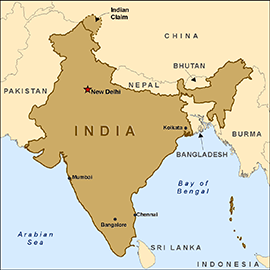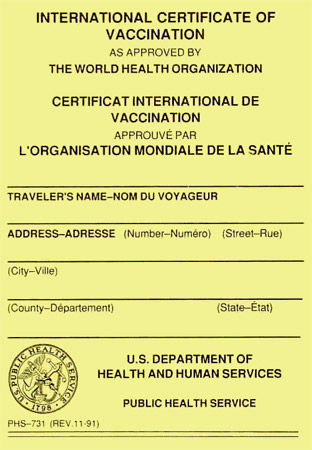Health and Medical: Immunizations
From the US Centers for Disease Control
Latest advice:
| Vaccines for disease | Recommendations | Clinical Guidance for Healthcare providers |
|---|---|---|
| Routine vaccines |
Make sure you are up-to-date on all routine vaccines before every trip. Some of these vaccines include
|
Immunization schedules |
| COVID-19 | All eligible travelers should be up to date with their COVID-19 vaccines. Please see Your COVID-19 Vaccination for more information. |
COVID-19 vaccine |
| Chikungunya | There has been evidence of chikungunya virus transmission in India within the last 5 years. Chikungunya vaccination may be considered for the following travelers:
|
Chikungunya - CDC Yellow Book |
| Cholera | Cholera is presumed to be present in India. Cholera is rare in travelers. Certain factors may increase the risk of getting cholera or having severe disease (more information). Avoiding unsafe food and water and washing your hands can also help prevent cholera. Vaccination may be considered for children and adults who are traveling to areas of active cholera transmission. |
Cholera - CDC Yellow Book |
| Hepatitis A | Recommended for unvaccinated travelers one year old or older going to India. Infants 6 to 11 months old should also be vaccinated against Hepatitis A. The dose does not count toward the routine 2-dose series. Travelers allergic to a vaccine component or who are younger than 6 months should receive a single dose of immune globulin, which provides effective protection for up to 2 months depending on dosage given. Unvaccinated travelers who are over 40 years old, immunocompromised, or have chronic medical conditions planning to depart to a risk area in less than 2 weeks should get the initial dose of vaccine and at the same appointment receive immune globulin. |
Hepatitis A - CDC Yellow Book Dosing info - Hep A |
| Hepatitis B | Recommended for unvaccinated travelers younger than 60 years old traveling to India. Unvaccinated travelers 60 years and older may get vaccinated before traveling to India. |
Hepatitis B - CDC Yellow Book Dosing info - Hep B |
| Japanese Encephalitis | Recommended for travelers who
Consider vaccination for travelers
Not recommended for travelers planning short-term travel to urban areas or travel to areas with no clear Japanese encephalitis season. |
Japanese encephalitis - CDC Yellow Book Japanese Encephalitis Vaccine for US Children |
| Malaria | CDC recommends that travelers going to certain areas of India take prescription medicine to prevent malaria. Depending on the medicine you take, you will need to start taking this medicine multiple days before your trip, as well as during and after your trip. Talk to your doctor about which malaria medication you should take. Find country-specific information about malaria. |
Malaria - CDC Yellow Book Considerations when choosing a drug for malaria prophylaxis (CDC Yellow Book) Malaria information for India. |
| Measles | Cases of measles are on the rise worldwide. Travelers are at risk of measles if they have not been fully vaccinated at least two weeks prior to departure, or have not had measles in the past, and travel internationally to areas where measles is spreading. All international travelers should be fully vaccinated against measles with the measles-mumps-rubella (MMR) vaccine, including an early dose for infants 6–11 months, according to CDC’s measles vaccination recommendations for international travel. |
Measles (Rubeola) - CDC Yellow Book |
| Rabies | Dogs infected with rabies are commonly found in India. Rabies is also present in some terrestrial wildlife species. If rabies exposures occur while in India, rabies vaccines are typically available throughout most of the country. Rabies pre-exposure vaccination considerations include whether travelers 1) will be performing occupational or recreational activities that increase risk for exposure to potentially rabid animals and 2) might have difficulty getting prompt access to safe post-exposure prophylaxis. Please consult with a healthcare provider to determine whether you should receive pre-exposure vaccination before travel. For more information, see country rabies status assessments. |
Rabies - CDC Yellow Book |
| Typhoid | Recommended for most travelers, especially those staying with friends or relatives or visiting smaller cities or rural areas. |
Typhoid - CDC Yellow Book Dosing info - Typhoid |
| Yellow Fever | Any traveler ≥9 months old arriving by air or by sea without a YF vaccination certificate will be detained in isolation for ≤6 days if they
|
Yellow Fever - CDC Yellow Book |
The above information has been excerpted from the US "Centers for Disease Control and Prevention" website and was last updated by World Trade Press on Monday, 1st July, 2024. Addtional information is available at https://cdc.gov
Copyright © 1993—2024 World Trade Press. All rights reserved.

 India
India 
